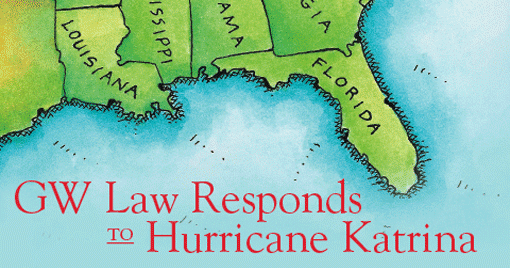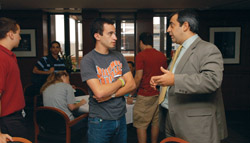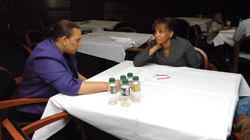|

By Laura Ewald
In late August, Anthony Coppola was settling
into his second year at Tulane Law School—he
had a class list, textbooks, three new roommates,
and plans to visit a friend’s beach house
in Florida for the weekend. He made it to Florida,
but under vastly different circumstances; as
Hurricane Katrina tore through the Gulf Coast,
Coppola was among thousands whose plans and lives
changed
in a matter of days.

|

Assistant
Dean for Student Affairs David Johnson
discusses class schedules with displaced
students from New Orleans during a
special orientation session.
Claire Duggan
|
Coppola and 13 other students from Tulane and
Loyola School of Law found new homes at GW Law
in September in the wake of the disaster. Faculty
and staff worked with the Student Bar Association
to help the visitors adjust.
“The faculty is pleased that the Law School
is in the position to take in students from New
Orleans,” says Renee DeVigne, associate
dean for student affairs. “They are happy
to be here and grateful for the support, and
we have benefited from their presence in our
classrooms.”
The new students
were welcomed with a breakfast and orientation
session Sept. 9. Faculty members gave students
course overviews, registration advice, and one-on-one
mentoring sessions. Textbook publishers including
Aspen, Foundation Press, Thompson-West, and Lexis
provided books free of charge to the students,
who were also given lockers, laptop computers,
mailboxes, and other supplies. The Folger Shakespeare
Library donated tickets to Much
Ado About Nothing as a chance for the students to experience
Washington culture. Those who did not have
friends or relatives in the Washington area
were given assistance with finding housing
and furnishings.
“The support I’ve received has made
it a lot easier for me to focus in on my
studies,” says
Coppola, who is temporarily living with his
parents in Vienna, Va. “I’m looking
forward to returning to Tulane, but everyone
at the Law School has made me feel very welcome
here. I’m
as settled as I can be under the circumstances.”
The Student Bar Association organized numerous
fundraisers and events, from poker tournaments
to clothing drives. Students volunteered temporary
housing. Through activities such as a baseball
outing, they also sought to help the displaced
students enjoy social activities with their
new peers.
“We realized this wasn’t a one-week
deal, so we have focused our efforts on
making this a semester-long project to raise money and
support,” SBA President Eric Koester
says. “I
think we’ve realized that this has
been a tragedy, but even miles away, we
can make an impact, and hopefully we will
continue to do so.”

Associate Dean for Student Affairs Renee DeVigne (left) advises visiting
3L Stephanie Bridges, who hopes to return to Loyola School of Law
in the spring.
Claire Duggan
|

|
The SBA is raising $75,000 for Operation
Home Delivery through Habitat for Humanity.
With that donation, they will either build
a home in Washington to be framed and shipped
to the Gulf Coast region or send students
to the area to build a home during spring
break.
The displaced law students have also received
aid from other departments within the University:
an employee in GW’s Athletics Department
helped 3L Stephanie Bridges and her family by
offering them one side of a duplex in Falls Church,
Va., and outfitting the home with furniture,
bedding, and kitchenware. The duplex is owned
by the employee’s brother, who
is currently working as a contractor
in Iraq.
Bridges and her family evacuated
New Orleans just a few hours before Katrina
hit the coast, traveling to Atlanta,
where family members were waiting. At
her husband’s suggestion, Bridges
decided to continue her legal education
and identified GW Law as a possibility. They arrived
in Washington just before the deadline for displaced
student enrollment.
Bridges says she and her husband thought
it was important for her to continue her
education in order to set an example of perseverance
and continuity for their children. She is grateful
for the support she’s received from GW Law and looks forward
to the possibility of returning home for the
spring semester—though she says the future
still seems unclear. “We are taking things
one day at a time.”
|